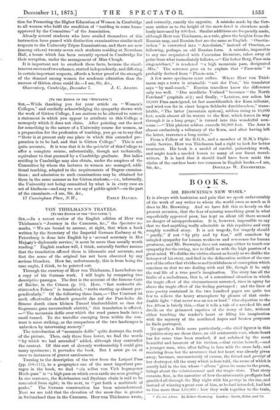VON THIELMANN'S TRAVELS.
[TO THE EDITOR OF THE "SPECTATOR."] 'Snt,—In a recent review of the English edition of Herr von Thielmann's "Journey in the Caucasus, &c.," the Spectator re- marks, " We are bound to assume, at sight, that when a book written by the Secretary of the Imperial German Embassy at St. Petersburg is done into English by a ' second secretary in Her Majaaty's diplomatic service,' it must be more than usually worth reading." English readers will, I think, naturally further assume that the translation offered them is idiomatic and accurate, and that the sense of the original has not been obscured by any serious blunders. How far, unfortunately, this is from being the case ought, I think, to be pointed out.
Through the courtesy of Herr von Thielmann, I have before me a copy of his German work. I will begin by comparing two 'descriptive passages. The first is the account of the famous Gate of Baidar, in the Crimea (p. 10). Here, " fast senkrecht ab- stiirzenden Felsen" is translated, "rocks starting up almost per- pendicularly." Of the following three lines,—" Der Contrast ist noch effectvoller dadurch gemacht das auf der Pass-hiihe die Strasse durch einen kleinen Tunnel hindurchfiihrt so dass der 'Gegensatz ganz unvermittelt eintritt," this translation is offered, —" The mountain defile over which the road passes leads into a small tunnel. To the traveller emerging from within the con- trast is most striking, as the comparison of the two landscapes is unbroken by intervening scenery."
The introduction of "mountain defile" quite destroys the truth of the picture. Then, only three lines lower, we find the words -" by which we had ascended" added, although they contradict the context. Of this sort of slovenly workmanship I could give many specimens ; it pervades the book. But I must go on at once to instances of graver carelessness.
Turning to the description of the view from the Latpari Pass (pp. 108-111), to a geographer one of the most important pas- sages in the book, we find " ein selbst von Vieh begangener Hoch-pass" is "a high pass on which even cattle are seen grazing." In one sentence, the Kotchantau and Dychtau chain is said to be concealed from sight; in the next, to "put forth a multitude of peaks." The German construction has been misunderstood. Next we are told that the elevation of the snow-line is greater in Switzerland than in the Caucasus. Herr von Thielmann wrote, and correctly, exactly the opposite. A mistake made by the Ger- man author as to the height of the snow-level is elsewhere need- lessly increased by 400 feet. Similar additions are frequently made, although Herr von Thielmann, as a rule, gives the heights from the Russian map, and Russian feet are the same as English. " Ossetia- ischen " is converted into " Assetinian," instead of Ossetian,— following, perhaps, an old Russian form. A mistake, impossible to any one acquainted with Caucasian literature, takes away all point from what immediately follows,—" Ein holier Berg, Pass-mta eingezeichnet," is rendered "a high mountain pass, designated -Alta." The sentence goes on to explain that " Pass-mta " is probably derived from " Phasis-mta."
A few more specimens must suffice. Where Herr von Thiel- mann says a town is attainable " mit der Post," his translator says " by mail-coach."' Russian travellers know the difference only too well. " Das niirdliche Vorland " becomes " the North Foreland " (capitals sic); and finally, " Letztere, nur selten bis 10,000 Fuss ansteigend, ist fast ausachliesslich der Kura tributiir, and wird von ihr in einer langen Schlucht durchbrochen," trans- latable, "The latter [mountain system], seldom rising to 10,000 feet, sends almost all its waters to the Kur, which forces its way through it in a long gorge," is turned into this wonderful non- sense :—" This plateau seldom exceeds 10,300 feet. The Arax is almost exclusively a tributary of the Kura, and after having left the latter, traverses a long ravine."
From a Fellow of the R.G.S., and a member of H.M.'s Diplo- matic Service, Herr von Thielmann had a right to look for better treatment. His book is a model of careful, painstaking work, and might teach a needed lesson to many of our fluent travel- writers. It is hard that it should itself have been made the victim of the careless baste too common in English books.—I am,






































 Previous page
Previous page